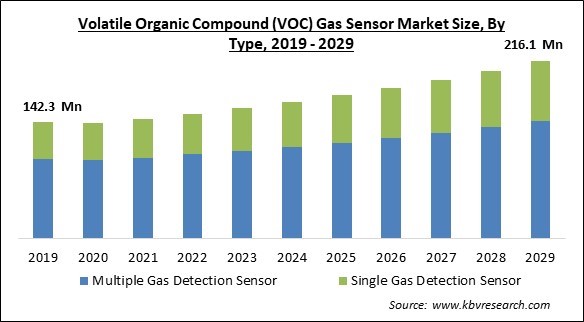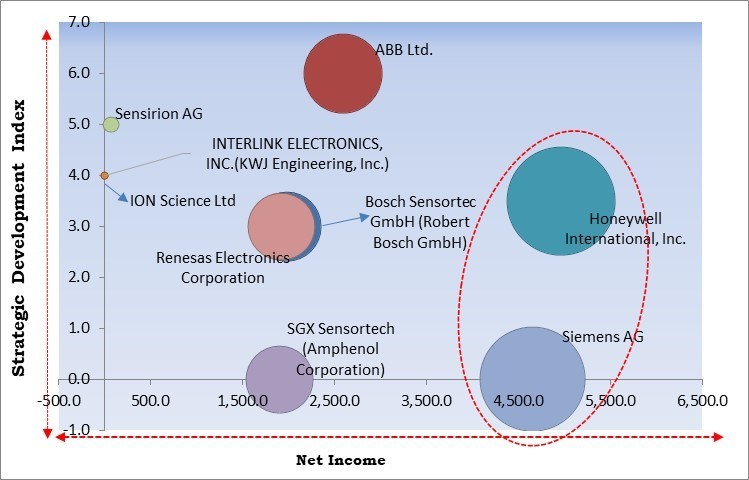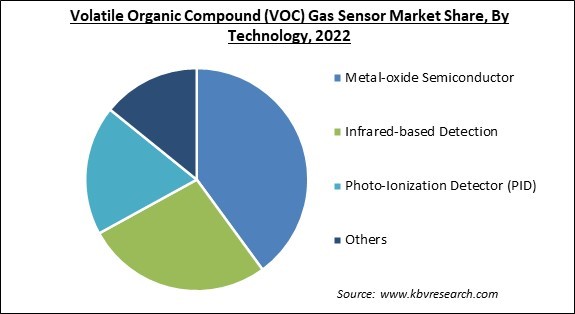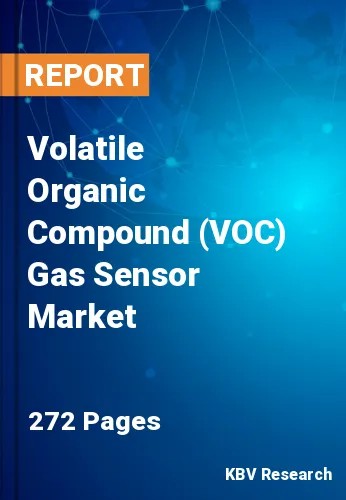The Global Volatile Organic Compound (VOC) Gas Sensor Market size is expected to reach $216.1 Million by 2029, rising at a market growth of 5.3% CAGR during the forecast period.
Metals & mining is one of the growing applications of volatile organic compound (VOC) gas sensor its operations often involve storing hazardous materials, such as chemicals, fuels, and solvents. VOC gas sensors can be installed in these storage areas to detect leaks or spills, enabling prompt response to mitigate risks and prevent accidents. Therefore, Metal & Mining procured $8,345.5 thousand revenue in the market in 2022. In mining operations, workers may also need to enter confined spaces, such as tunnels, shafts, or tanks, which can pose a significant risk of exposure to hazardous gases, including VOCs. VOC gas sensors can assess the air quality in these confined spaces before entry, providing early warning of potential dangers and enabling proper ventilation or using personal protective equipment (PPE).

The major strategies followed by the market participants are Product Launches as the key developmental strategy to keep pace with the changing demands of end users. For instance, In April 2021, Bosch Sensortec announced the launch of BME688, an air quality assessment solution. The BME688 features AI-powered sensing ability for barometric, gas, temperature, and humidity sensing. Additionally, In October, 2021, ABB announced the launch of the ABB FusionAir Smart Sensor, a room sensor used for observing Carbon dioxide, temperature, VOCs, and humidity. ABB FusionAir Smart Sensor features zero-touch control via its app and connectivity with ABB Cylon ASPECT.
Based on the Analysis presented in the KBV Cardinal matrix; Honeywell International, Inc. and Siemens AG are the forerunners in the Market. In September 2022, Honeywell unveiled the VESDA Air solution used for Indoor air quality monitoring and smoke detection. VESDA Air solution features VESDA-E smoke detectors and IAQ sensors used for measuring IAQ limits. Companies such as ABB Ltd., Bosch Sensortec GmbH, Renesas Electronics Corporation are some of the key innovators in Market.

One of the key trends in the market is the expanding Internet of Things (IoT) integration. This, along with other notable trends, including the increasing focus on energy efficiency, improvements in sensing technology, and the development of smart cities, have propelled the use of gas sensors. As a result, the advancement of VOC gas sensors has seen a considerable trend toward incorporating IoT technology. IoT enables real-time control and remote monitoring of air quality by allowing VOC sensors to be interconnected to the internet as well as other digital devices. In addition, the integration of VOC sensors and monitors with tablets, smartphones, and wearable technology nowadays ensures that users are protected from VOC gases, which boosts demand for VOC sensors. This will accelerate the expansion of the market throughout the forecast period.
Increasing industrial activity has made wastewater a serious issue in both developed as well as developing nations. Water and natural resource conservation is a top priority for many governments and non-governmental organizations. Each year, a large number of people around the world contract diseases brought on by consuming contaminated water, such as typhoid, dysentery, cholera, and polio. In order to receive early warnings of equipment issues and water quality problems, monitoring systems are employed in water & wastewater facilities. Due to the implementation of strict regulations, firms must build treatment facilities and monitor the gases they produce, which will spur market expansion.
Air pollution monitoring systems, ventilation systems, and automobiles, their high manufacturing costs have delayed sales. They are impeding the market's ability to grow its income. Another factor is the intense competition amongst the increasing number of manufacturers. Many companies are concentrating their R&D efforts on developing IoT-compatible sensors and affordable gas sensor systems employing Micro Electromechanical System (MEMS) technology. In cases where gas sensors are regularly utilized, this puts stress on prices. Because of this, manufacturers are compelled to reduce the potential price of gas sensors and hence reduce output. Therefore, these factors could negatively impact the market's growth throughout the projection period.
Based on technology, the market is characterized into photo-ionization detector (PID), infrared-based detection, metal-oxide semiconductor, and others. The metal-oxide semiconductor segment garnered the highest revenue share in the market in 2022. By observing changes in the resistivity or conductivity of metal oxide substrates when the gas comes into contact with them, metal oxide semiconductor gas sensors determine the presence of VOC gases. This change is measured by the sensors' electronic circuitry, which then signals the existence of the gas.
On the basis of type, the market is classified into single gas detection sensor and multi gas detection sensor. The multi gas detection sensor segment acquired the largest revenue share in the market in 2022. The oil and gas, as well as petrochemical industries, make widespread use of portable and affordable multiple gas detection sensors for detecting a variety of chemicals, including formaldehyde, benzene, methylene chloride, and perchloroethylene, among others, and for pipeline operations monitoring.

By application, the market is divided into oil & gas, agriculture, automotive & transportation, chemical industry, manufacturing, food & beverages, metals & mining, and others. The food and beverages segment garnered a remarkable growth rate in the market in 2022. In the upcoming years, it is anticipated that initiatives for smart manufacturing and digital transformation will be quickly adopted in the food and beverage industry. Numerous players in the food processing industry who operate at various points throughout the value chain are anticipated to contribute to this increase.
| Report Attribute | Details |
|---|---|
| Market size value in 2022 | USD 151.7 Million |
| Market size forecast in 2029 | USD 216.1 Million |
| Base Year | 2022 |
| Historical Period | 2019 to 2021 |
| Forecast Period | 2023 to 2029 |
| Revenue Growth Rate | CAGR of 5.3% from 2023 to 2029 |
| Number of Pages | 272 |
| Number of Table | 404 |
| Report coverage | Market Trends, Revenue Estimation and Forecast, Segmentation Analysis, Regional and Country Breakdown, Competitive Landscape, Companies Strategic Developments, Company Profiling |
| Segments covered | Type, Technology, Application, Region |
| Country scope | US, Canada, Mexico, Germany, UK, France, Russia, Spain, Italy, China, Japan, India, South Korea, Singapore, Malaysia, Brazil, Argentina, UAE, Saudi Arabia, South Africa, Nigeria |
| Growth Drivers |
|
| Restraints |
|
Region wise, the market is analyzed across North America, Europe, Asia Pacific, and LAMEA. The Asia Pacific segment recorded the highest revenue share in the market in 2022. The market's expansion can be related to the rising need for industrial and environmental monitoring solutions in this region. Asia Pacific is home to several developing nations, including Taiwan, Australia, Japan, India, and Japan, all experiencing rapid industrialization and urbanization, leading to increased environmental deterioration.
Free Valuable Insights: Global Volatile Organic Compound (VOC) Gas Sensor Market size to reach USD 216.1 Million by 2029
The market research report covers the analysis of key stake holders of the market. Key companies profiled in the report include Honeywell International, Inc., Siemens AG, Alphasense, Inc., Bosch Sensortec GmbH (Robert Bosch GmbH), ABB Ltd, Renesas Electronics Corporation, Sensirion AG, Interlink Electronics, Inc. (KWJ Engineering, Inc.), SGX Sensortech (Amphenol Corporation), and ION Science Ltd.
By Type
By Application
By Technology
By Geography
The Market size is projected to reach USD 216.1 Million by 2029.
Expanding wastewater and water treatment sector are driving the Market in coming years, however,High volatility of prices and further challenges to the stability restraints the growth of the Market.
Honeywell International, Inc., Siemens AG, Alphasense, Inc., Bosch Sensortec GmbH (Robert Bosch GmbH), ABB Ltd, Renesas Electronics Corporation, Sensirion AG, Interlink Electronics, Inc. (KWJ Engineering, Inc.), SGX Sensortech (Amphenol Corporation), and ION Science Ltd.
The expected CAGR of this Market is 5.3% from 2023 to 2029.
The Oil & Gas segment is leading the Market by Application in 2022 thereby, achieving a market value of $61.4 Million by 2029.
The Asia Pacific market dominated the Market by Region in 2022 and would continue to be a dominant market till 2029; thereby, achieving a market value of $74 Million by 2029.
Our team of dedicated experts can provide you with attractive expansion opportunities for your business.

